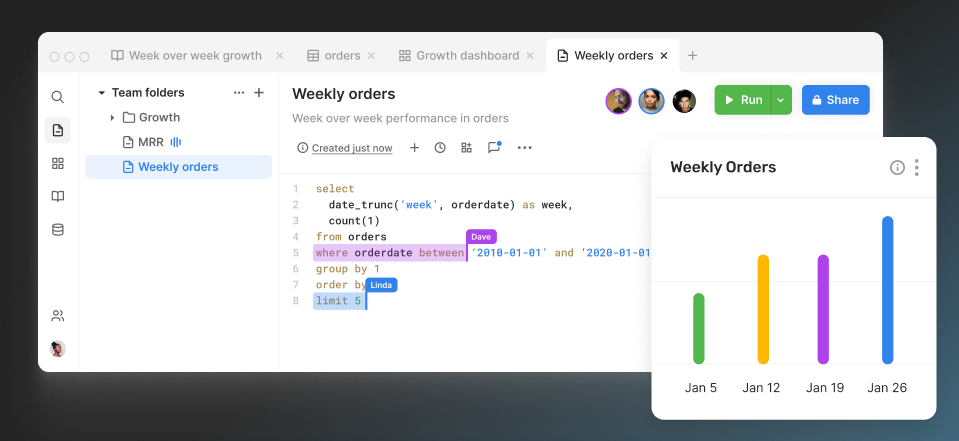Rahil Sondhi has been coding since he was 10 years old, and even when his career took him in the direction of an engineer, he was still writing a lot of SQL and working with data.
That’s when he realized that many of the tools he was using were tedious, clunky and slow — basically none of the traits anyone wants in their software. Most importantly, they didn’t help with the subsequent tasks in the workflow, Sondhi told TechCrunch.
“The most basic task is connecting to the database, writing the query, then getting the results,” he added. “But what you often have to do next is save the query somewhere, send it to someone else so they can review it and make sure it’s good or if you make a data table or charts, have an easy way to share that.”
He explains that with previous tools, most of those tasks involved exporting to a .csv file, importing into Google Sheets and sharing from there in Slack or another channel. He cited a Gartner report that “through 2023, data scientists and analysts will lose 60% to 70% of their productive time to activities like finding, preparing, integrating and sharing datasets.”
PopSQL raises a $3.4M seed round for its collaborative SQL editor

That loss of productivity was especially evident while Sondhi was working at Instacart in 2017 and was reliant on querying data to answer questions from stakeholders and support any business cases. Not impressed with that process, he thought there needed to be a more collaborative SQL editor that not only looked good, but was also compatible with any operating system.
Enter PopSQL, pronounced “popsicle,” both a desktop and web tool that enables users to connect to the database, write a SQL query and easily share it. The tool will also help along the way, for example, with constructing the right query to get the right data and making sure the user understands the database — which tables are most popular and the ones to focus on.
Other business teams that need to work with data are also taking notice of PopSQL, like marketing, finance and support, Sondhi said.
“There’s this whole segment of people that need access to these insights to lead teams, so we make it really easy for people to pass links around,” he added. “The way our user experience and the new user interface works, it really lends itself to business users; even non-technical users feel comfortable using it because it is a lot less daunting than it was in the past.”
PopSQL raised a $3.4 million seed round, led by Gradient Ventures, back in September 2020, and is now back with $14 million in Series A funding. This time around, Tiger Global led the round and was joined by Gradient, FundersClub and Y Combinator. The latest funding gives the company $17.4 million in total funding.
The company wasn’t actively fundraising, but Sondhi met John Curtius from Tiger, who had been tracking the company for the last few months, and decided to take the offer for a new round due to the growth of the company.
PopSQL has doubled its employees since the seed round to 14 people, increased its revenue five times during the same time and grew from 300 customers to more than 2,000, including Vroom, Redfin, Shipt, Udacity, Ramp and doodle. That last feat is something Sondhi said he was proud of achieving with a lean team that didn’t have any outbound sales.
The new funding will enable the company to build both sales and market teams and add to the engineering team.
“We’re just pursuing our mission of creating the easiest way for teams to collaborate on data,” Sondhi added. “It’s been tough with like three engineers doing everything on the roadmap, so now we can go deeper into what we have. Initially, everything we built was a hypothesis, but now the Series A is a testament to that market validation.”































Comment